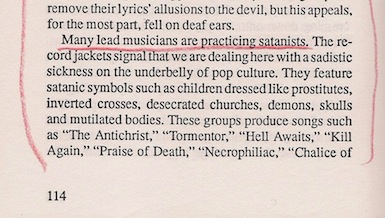Thinking the Unthinkable
John Wesley White
Lake Mary, FL: Creation House, 1992
The Salvation Army provideth. Three years ago, whilst whiling away an afternoon in one of their finer thrift stores, I happened upon
Arming for Armageddon by berugged Canadian evangelist John Wesley White. Wild, wondrous and weird, the book is perhaps the most imaginative and fanciful work I've ever reviewed. In its pages, Pastor White posits that Spain's King Juan Carlos is the Antichrist, praises murderous Guatemalan dictator José Efraín Ríos Montt, has Sid Vicious belting out "Anarchy in the UK", and warns against the evil influence of films like
I Married a Monster from Outer Space.
Arming for Armageddon was published in 1983, during what were some of the frostiest days of the Cold War. A great deal had changed when
Thinking the Unthinkable hit bookstore shelves: the Soviet Union had collapsed, the Berlin Wall had crumbled and actress Kristy McNichol had given her penultimate performance on
Empty Nest.
Purchasing
Thinking the Unthinkable, I was prepared to pity the poor preacher. So much of his interpretation of scripture had had the USSR playing a key role in the End Times. According to White, Ronald Reagan's "Evil Empire" would prove itself very evil indeed. The pastor wrote about this not only in
Arming for Armageddon, but
Re-entry: Striking Parallels Between Today's News Events and Christ's Second Coming (1971),
WW III: Signs of the Impending Battle of Armageddon (1981),
The Coming World Dictator (1981) and, predictably,
Re-entry II (1985).
How would Pastor White handle the simple fact that there was no more Soviet Union? Its death must have brought about much rethinking and – forgive me – soul searching. One fairly feels the pangs of nostalgia when he writes in
Thinking the Unthinkable, "what for seventy-four years had been the USSR is no more." This is the only acknowledgement of the Evil Empire's dissolution; in the 211 pages that follow the Soviet Union is very much alive with "shifty" Mikhail Gorbachev in charge.
All this print and paper discredits People's Church (Toronto) pastor Paul B. Smith's blurbed back cover belief that "John Wesley White has a grasp on world affairs that is uncanny."
There's a fair amount of recycling going on here. King Juan Carlos, José Efraín Ríos Montt and Sid Vicious all reappear in these pages. Pastor White continues to be troubled by a Hollywood blockbuster entitled
The Little Beast, of which IMDb has no record.
I Married a Monster from Outer Space has been joined by such "supernatural and satanic" films as
The Idolmaker and
Devil in a Blue Dress.
Snicker if you will, but those doubting the pastor as a prophet should note that the latter film was not released until three years after the book's publication.
I regret to report that, like
Arming for Armageddon,
Thinking the Unthinkable has me rethinking the value of an Oxford education. Pastor White, who holds a Ph.D. from the university, plays pretty loose when it comes to references.
There are none.
Franklin Graham, son of Billy, blurbs that this book contains "breathtaking facts that prick one's mind to action", but none of these burst my balloon:
• "Jews, of course, invented the engines of war, all the way from nuclear bombs to the sophisticated guidance systems of vehicles that are able to deliver them."
• "A Swedish bicycle has been produced that uses highly flammable plastic, and General Motors Corporation announced that it could shortly be manufacturing a car of the same substance."
• "A network TV newsman observed that there have been twenty-eight macro-earthquakes since 1958, compared to twenty-four during the whole period before that since the birth of Christ."
Mid-way through Thinking the Unthinkable, Pastor White cites a poll of teenagers that was published in the Chicago Tribune. He doesn't say when or where it was taken, and the sample size is left up in the air, but I don't doubt its findings: "Sixty-five percent of the kids thought a nuclear war would happen in the next ten years and that they would not survive it."
My teenage self wasn't quite so pessimistic; I thought I'd survive. By 1992, the year I turned thirty, I was feeling pretty darn good about the future.
Object: A bland-looking, though well-constructed trade paperback, Thinking the Unthinkable is blessed with a cover that at fleeting glance looks like something flogged by a motivational speaker. My copy has been marked by someone who appears to have been particularly interested in cults.
Access: Thinking the Unthinkable is much more common in libraries south of the border; Worldcat reports 27 American-held copies to Canada's two. I was surprised to find that the closest to me is located at an institution of which I'd never heard: Redeemer University College, located less than a two-hour drive from my home. Thirty-nine copies are listed through online booksellers, most of which can be had for under a dollar. An optimistic bookseller in rural Nova Scotia is hoping to get seven American dollars. I was charged 75¢ by the good folks of the Stratford Salvation Army Thrift Store.
A personal note: This past Sunday, as I put down Pastor White's book, my old friend Michael Bartsch emailed this photo he'd taken just outside Emigrant, Montana:
Make of this what you will.























